As a SaaS company, your success is heavily dependent on customer satisfaction and retention. One key metric used to measure this is Net Promoter Score (NPS).
NPS measures customer willingness to recommend a product or service. A high NPS score indicates that your customers are satisfied and loyal, which is crucial for the growth of your SaaS business.
Ever wondered what is a good NPS rating for your SaaS business?
In this article, we will discuss the importance of NPS for SaaS companies and provide tips on how to achieve high NPS scores.
What is NPS?
NPS, or net promoter score, is an internationally recognized metric for evaluating customer loyalty. The model assesses the probability of an existing customer recommending a business’s product or service to someone else.
It’s defined on a scale of 0 to 10 and divides customers into three groups:
- Promoters (9-10): Loyal customers happy to recommend you to others (and bring new customers through word of mouth)
- Passives (7-8): They are not unhappy customers but will most likely churn when a better deal appears
- Detractors (0-6): Dissatisfied users who may complain about your app to others and hurt your reputation
The NPS score for a business is obtained by subtracting the percentage of detractors from the percentage of promoters.
Since the beginning, NPS scores have been a top priority and strategic goal for leaders because they are seen as a direct reflection of the relationship between customers and the business.
The score of customer loyalty and satisfaction may vary across industries, but each industry will have its own recognized standards that serve as benchmarks. SaaS businesses are no exception in this regard.
What is a good NPS score for SaaS?
Finding an exact number to set as an average SaaS NPS score benchmark is a difficult task.
The reason is the wide range of domains that today’s SaaS businesses cater to. From retail to education, entertainment, life sciences, finance, healthcare, and even government bodies leverage SaaS solutions from different vendors.
The wide range of apps available on the market makes determining a precise estimate for the general SaaS NPS challenging.
But based on various assessments, an average SaaS NPS of around 50 would be considered decent, although notable SaaS brands achieve NPS scores as low as 28.
Average NPS for Popular SaaS Companies
| Company | Estimated NPS | Industry |
|---|---|---|
| Netflix | 67 | Media |
| Paypal | 65 | fintech |
| Microsoft | 31 | Technology |
| 19 | Social Media | |
| 58 | Project Management/Collaboration | |
| Dropbox | 54 | File Storage |
| Adobe | 33 | E-commerce |
| Mailchimp | 28 | E-mail marketing |
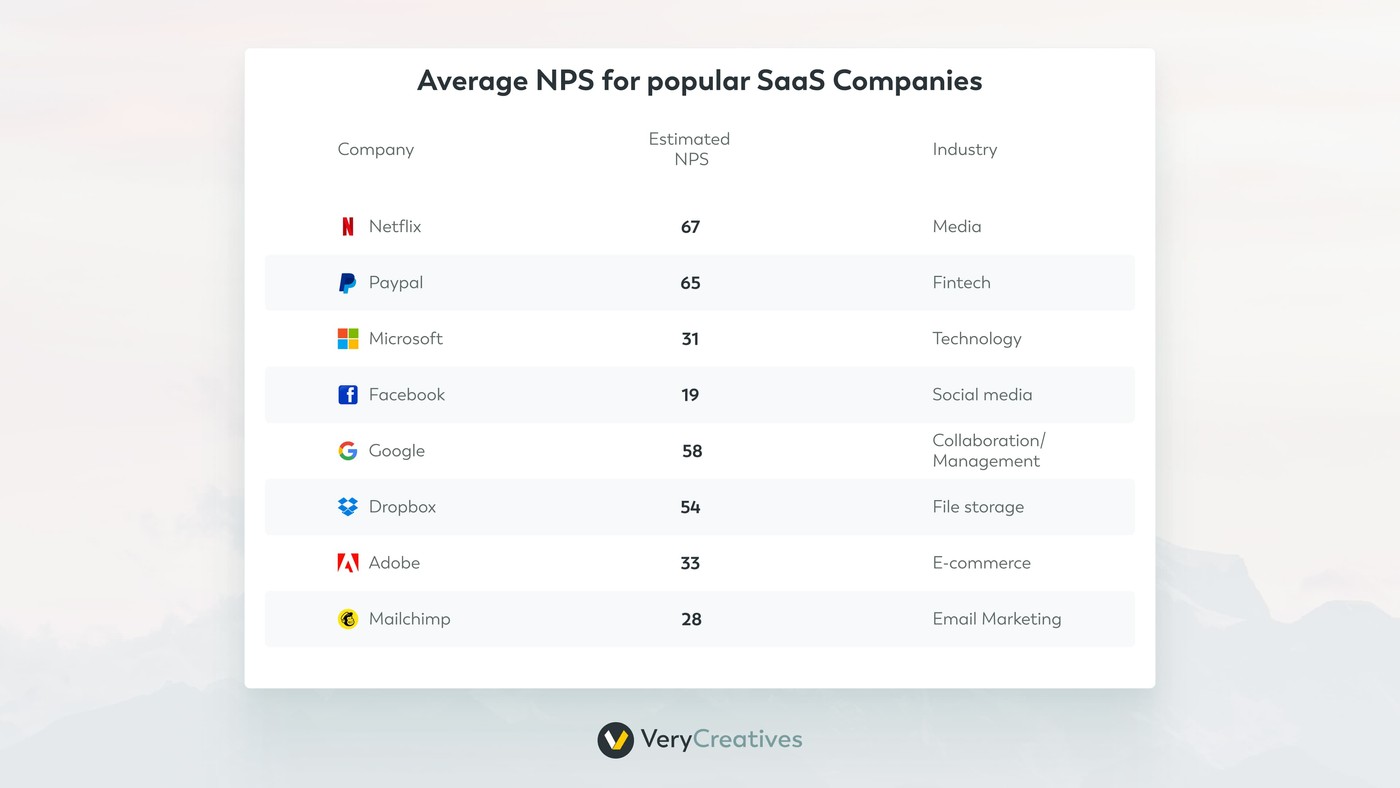
NPS Benchmarks for SaaS companies
According to the 2022 report on NPS, the average benchmark for software and apps is 18:
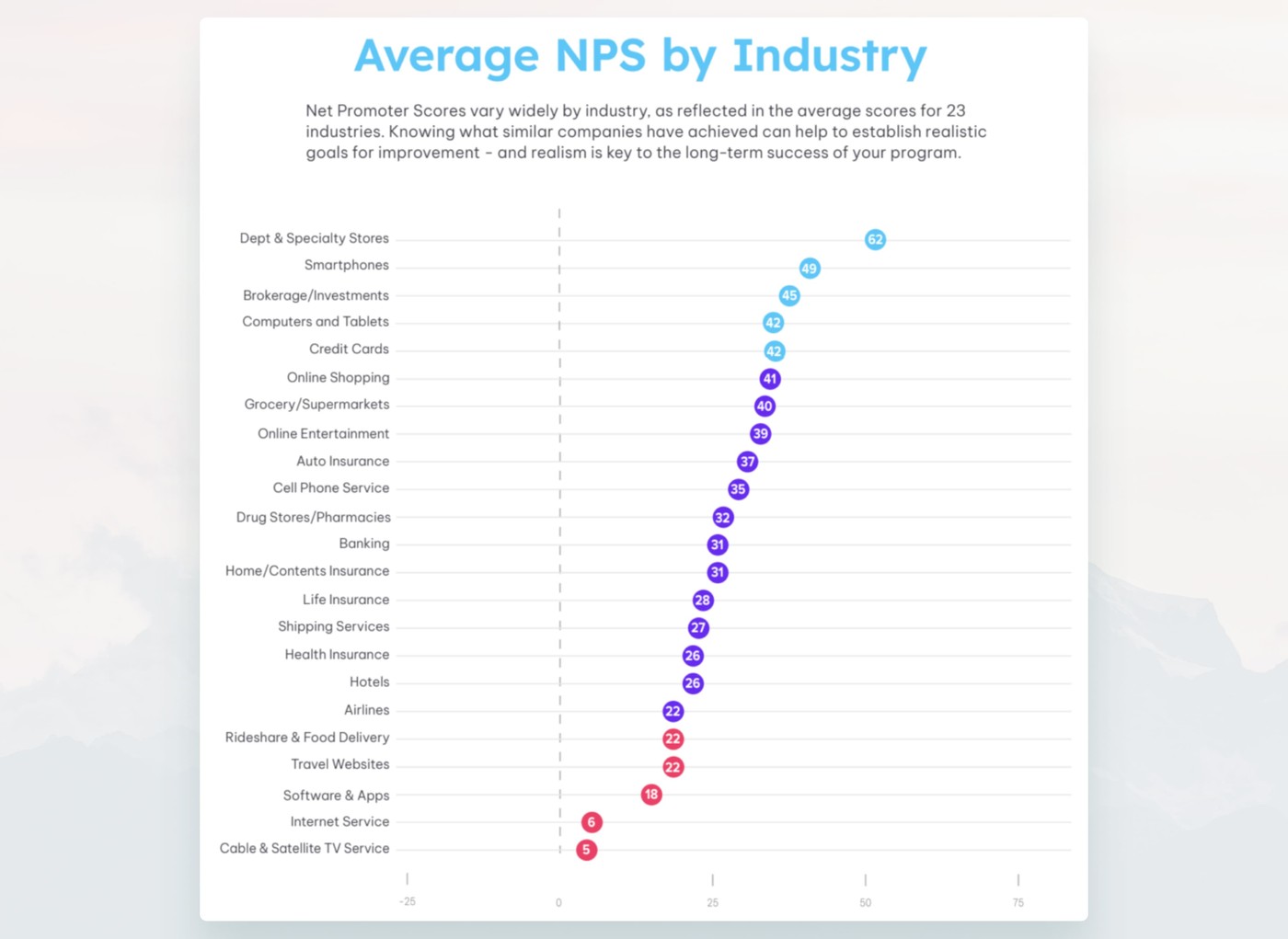
This number may be surprising. It’s not very high – and comparing it to the 2021’s score of 43, it’s clear the average NPS is on a decline.
But it’s not a reason to follow the worst practices and give up on this metric. Instead, offering remarkable user experience and customer service will help you retain users for a long time and increase your monthly recurring revenue (MRR)
Here are a few tips on how to approach increasing your NPS rate:
Tips for Achieving High NPS Scores
The journey to achieving a good NPS score starts from the first stage of building the business’s core SaaS platform.
For any SaaS business, customer-centric design and development is a must.
From selecting a technology architecture to defining a roadmap for deployment and maintenance, every stage must incorporate strategies that add valuable elements to the business’s overall customer appeal. This will directly influence positive NPS growth.
Now that we understand the importance of NPS for SaaS companies, let’s discuss some tips for achieving high NPS scores.
1. Focus on Customer Success
The key to achieving high NPS scores is to focus on customer success. This means ensuring that your customers are achieving their desired outcomes with your product. By understanding your customers’ goals and building positive customer relationships, you can increase their satisfaction and loyalty.
To do this, you can offer personalized onboarding and training, provide proactive support, and regularly check in with your customers to see how they are using your product and if they need any assistance.
2. Improve Your Product
As mentioned earlier, NPS provides valuable feedback from your customers. Use this feedback to identify areas for improvement in your product. This could be anything from adding new features to improving the user experience. By continuously improving your product based on customer feedback, you can increase customer satisfaction and loyalty, leading to higher NPS scores.
3. Encourage and Incentivize Referrals
As mentioned earlier, positive word-of-mouth can greatly impact your NPS scores. Encourage your satisfied customers to refer your product to others by offering incentives such as discounts or free upgrades. This not only helps increase your NPS scores, but also brings in new customers.
4. Monitor and Respond to Negative Feedback
While positive feedback is great, negative feedback can also provide valuable insights. Monitor your NPS scores and identify any customers who have given a low score.
Let your customer support team know about any case of negative feedback. Reach out to the customer and try to understand their concerns.
By addressing their issues and providing a solution, you can turn a dissatisfied user into a happy one, increasing their likelihood of recommending your product.
5. Use NPS as a Metric for Growth
NPS is not just a metric for customer satisfaction but also a predictor of growth. Use your NPS scores to track your progress over time and set goals for improvement.
This will help you stay focused on continuously improving your product and customer satisfaction, leading to higher NPS scores and ultimately, increasing your SaaS’ bottom line.
Why is NPS Important for SaaS Companies?
NPS is a powerful tool for SaaS companies because it both measures customer satisfaction and predicts future growth.
A good NPS score means that your customers are happy with your product and are likely to continue using it, renew their subscriptions, and recommend it to others. This leads to increased customer retention rate, lower churn rates, and ultimately, higher revenue.
Additionally, NPS provides valuable feedback from your customers.
By asking the simple question, “How likely are you to recommend our product to a friend or colleague?” you gain insights into what your customers like and dislike about your product.
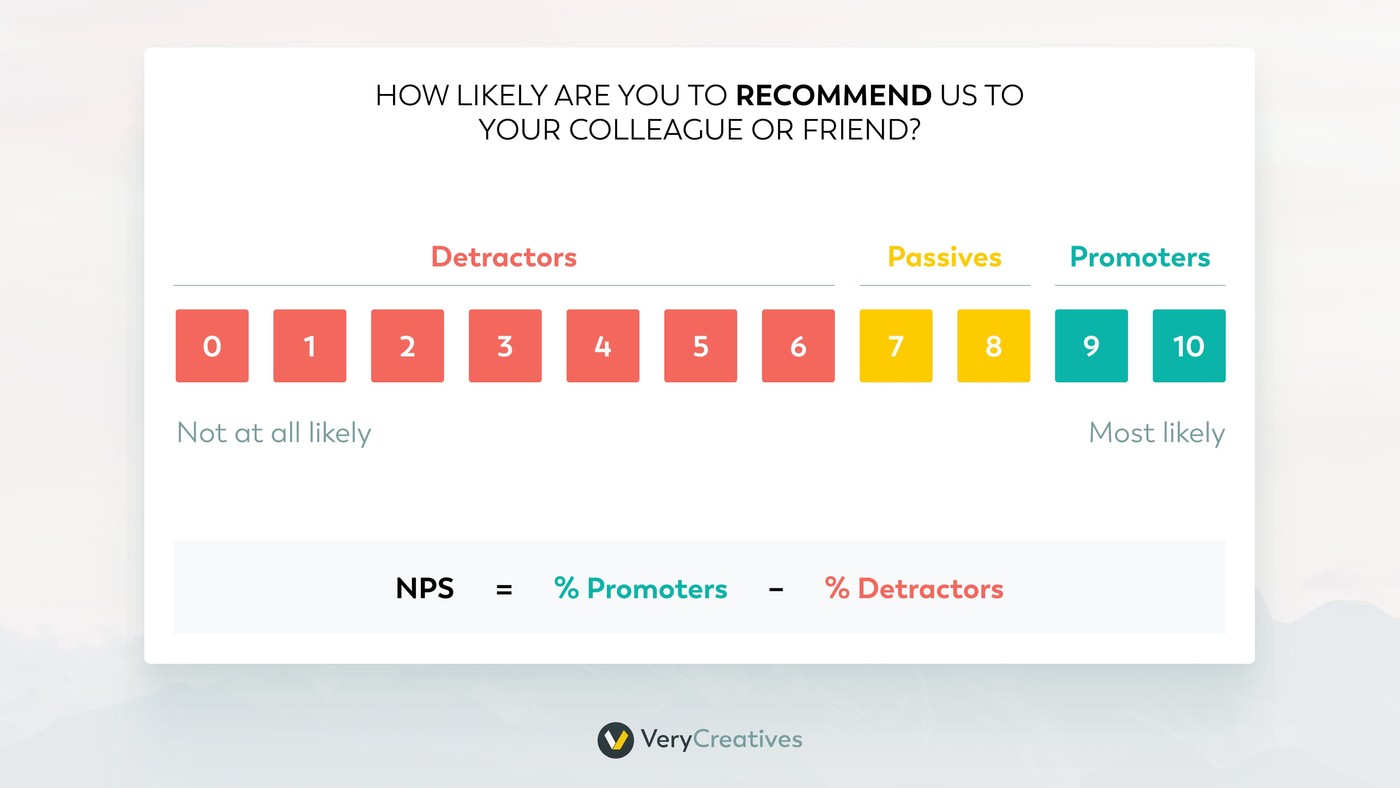
This feedback can help you identify areas for improvement and make necessary changes to keep your customers satisfied.
The Importance of Positive Feedback in SaaS Growth
Positive feedback from customers is crucial for the growth of any SaaS company.
It not only boosts morale within your team, but also serves as social proof for potential customers. When your customers are happy and willing to recommend your product, it creates a positive image for your brand and can attract new customers.
Take a look at how the founder of Snowflake uses the company’s positive user feedback for social media content:
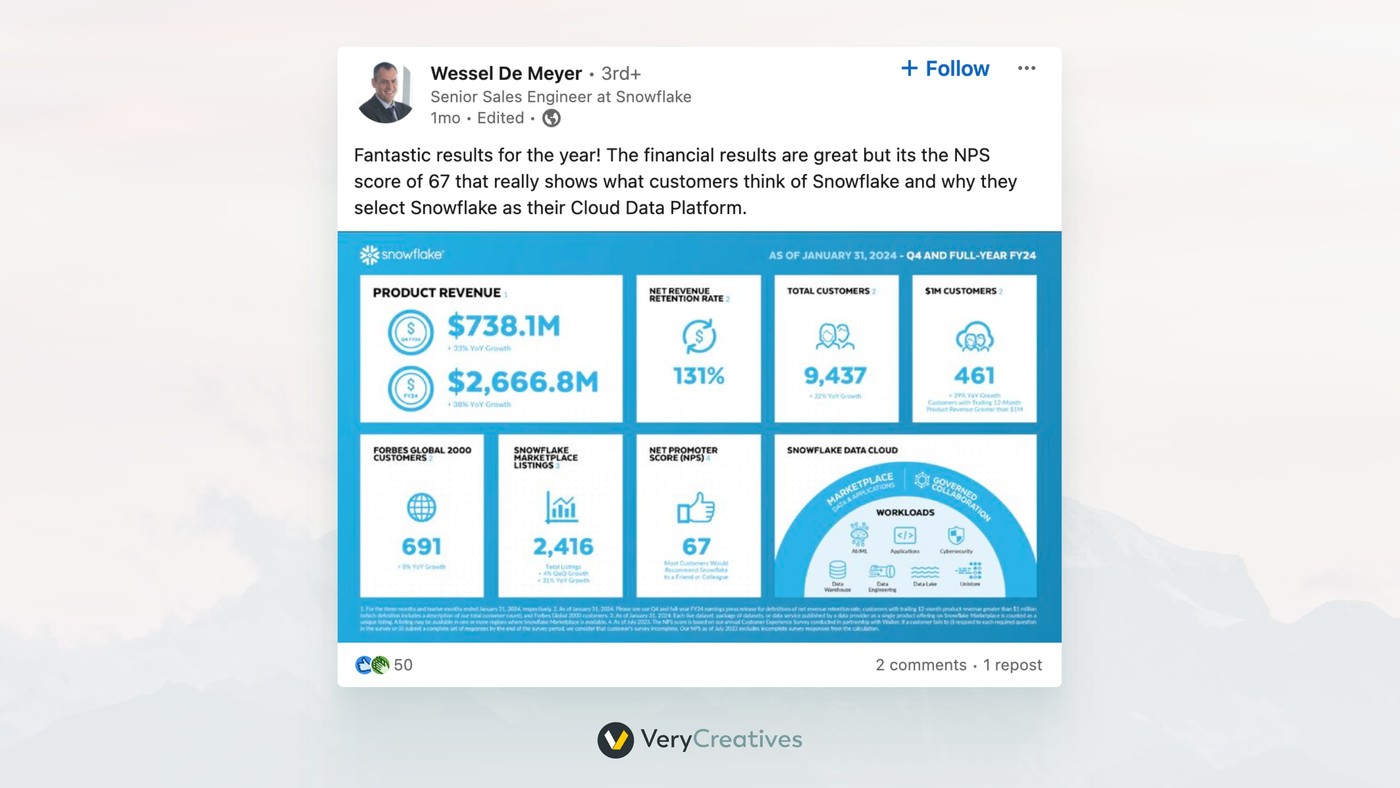
This is a perfect way to leverage social proof and stand out among other SaaS products.
Moreover, positive feedback can also lead to word-of-mouth marketing, which is one of the most effective forms of marketing. When your customers recommend your product to others, it can result in new leads and potential customers.
It’s true that several SaaS founders may not think about an NPS rating early on as they would be engaged in multiple other activities for promoting their business.
But we have already seen the major differences between SaaS marketing and traditional marketing strategies in a previous post. SaaS marketing requires unique approaches and storylines supported by solid calculations about the potential of the business to create ROI for investors in the future.
NPS scores play a crucial role in creating a foundation on which marketers can build convincing narratives to increase a startup’s credibility. Failure to obtain a good NPS score can create severe problems when SaaS companies scout for support from investors or when they are getting ready to go public with shares.
Lower NPS scores are known to drive away investor sentiments which if lost once will be hard to recover.
Apps to Help You Run an NPS Survey for SaaS
NPS surveys are crucial for gauging customer loyalty and predicting growth. Selecting the right app can streamline the process and provide insights for refining customer experience strategies. We examine various NPS survey apps and their features.
1. SurveyMonkey
SurveyMonkey, a well-known and extensive tool in the survey domain, offers strong functionalities for Net Promoter Score (NPS) surveys.
Its user-friendly interface allows businesses to efficiently create surveys, distribute them across multiple channels, and analyze results in real-time.
The platform’s advanced analytics capabilities enable users to segment NPS data, uncovering trends and valuable insights that can inform business decisions.
Also, SurveyMonkey seamlessly integrates with various customer relationship management (CRM) and analytics tools, ensuring a smooth flow of customer feedback into business processes, fostering informed decision-making and improved customer experiences.

2. Qualtrics
Qualtrics shines with its impressive analytical capabilities and broad customization options. It is ideal for businesses seeking deep insights into customer sentiment and behavioral patterns.
The platform enables users to craft highly personalized Net Promoter Score (NPS) surveys. Its intuitive logic tailoring questions based on prior responses ensures a seamless survey experience.
Qualtrics’ robust analytics engine offers granular reporting, sentiment analysis, and predictive intelligence. This makes it a crucial tool for businesses prioritizing a data-driven strategy for customer experience.
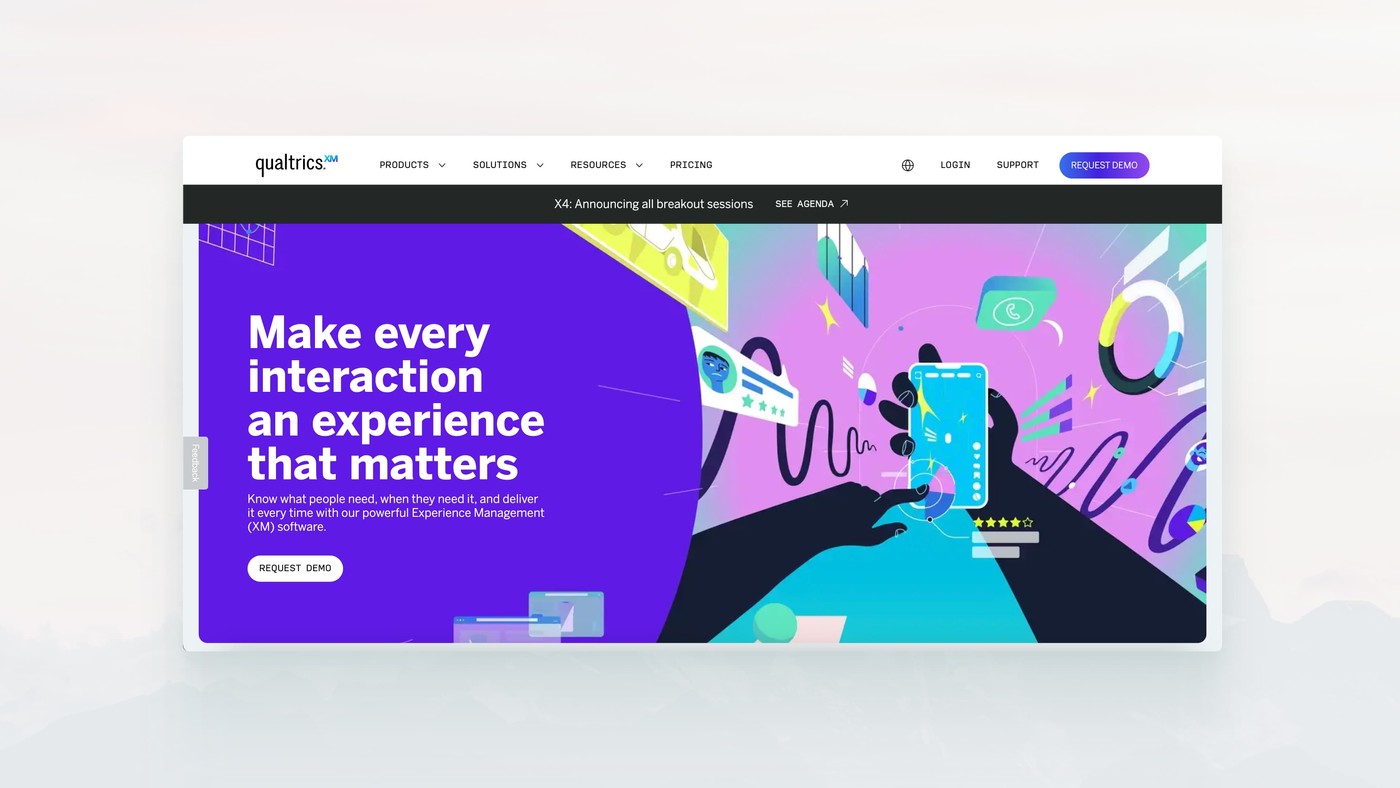
3. Delighted
Delighted simplifies the NPS survey process, focusing on ease of use and efficiency. With a clean interface and straightforward setup, it allows businesses to launch surveys within minutes.
Delighted offers various delivery options, including email, SMS, and web, ensuring that surveys reach customers through their preferred channels. The platform provides real-time feedback, with a dashboard that visually represents NPS scores over time, helping businesses quickly gauge customer loyalty trends.
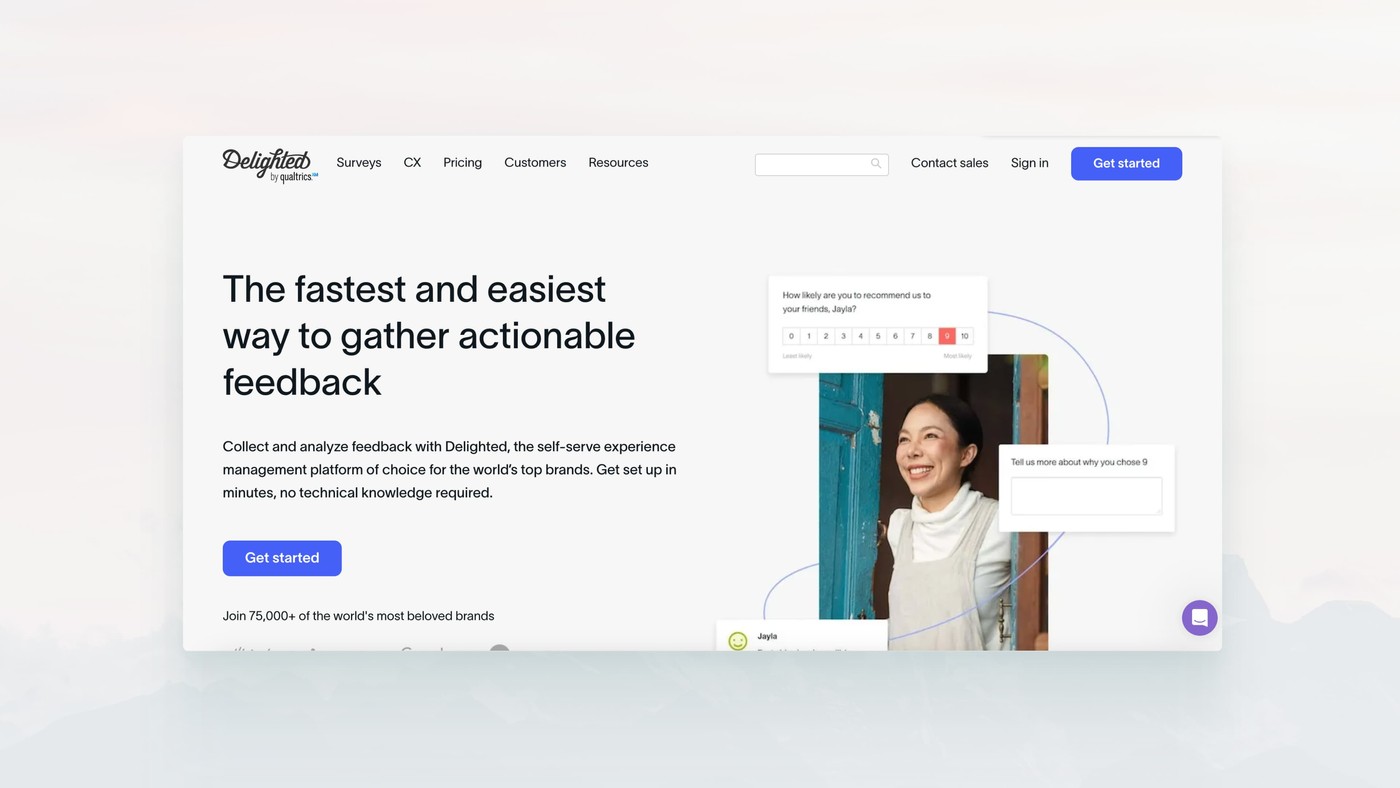
4. AskNicely
AskNicely is tailored for businesses looking to integrate NPS surveys into their daily operations. The platform emphasizes real-time feedback, enabling businesses to act swiftly on customer insights.
AskNicely offers a unique feature of scheduling surveys based on customer interactions, ensuring that feedback is timely and relevant. Its integration capabilities with CRM and other business systems automate workflows, making it easier for teams to respond to customer feedback and close the loop.
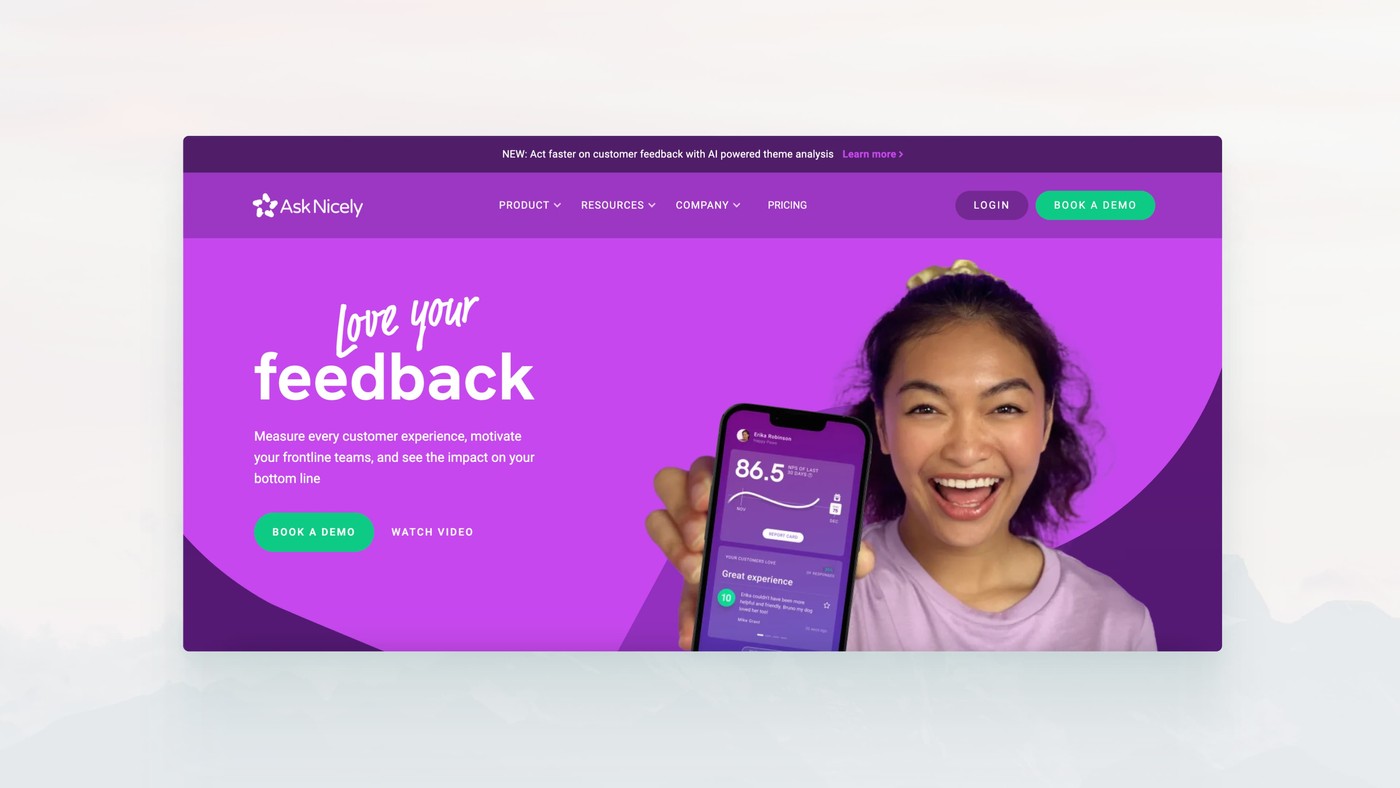
5. Typeform
Known for its design-centric approach, Typeform offers an engaging way to conduct NPS surveys. The platform’s emphasis on user experience results in surveys that are not only visually appealing but also more likely to be completed.
Typeform’s conversational interface makes surveys feel more like an interactive experience, which can lead to higher response rates. The platform provides detailed analytics and integrates with a wide range of tools, allowing businesses to incorporate NPS data into broader customer experience strategies.
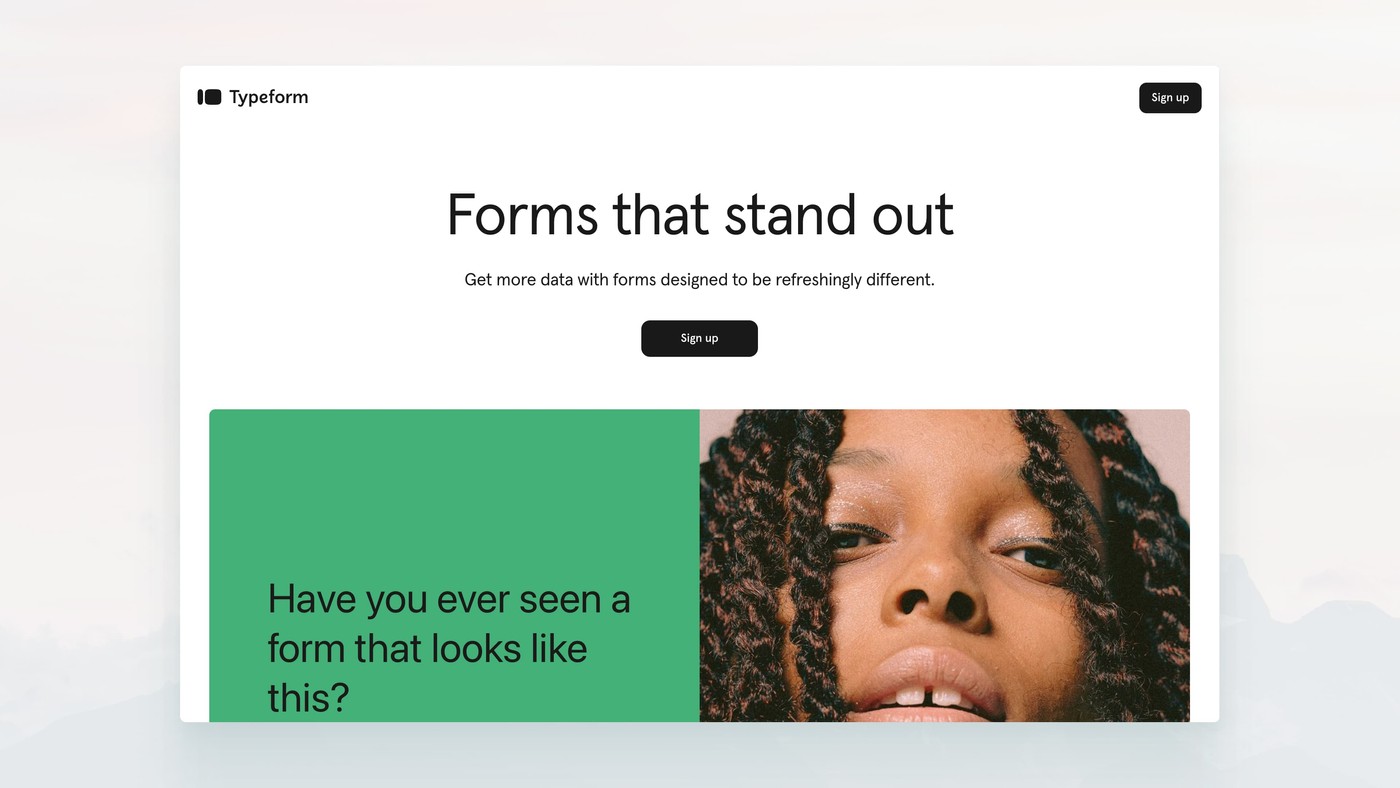
How to choose the best NPS survey app
Choosing the right NPS survey tool involves considering:
- Your business size
- The complexity of insights needed
- How the tool integrates with existing systems
Each of these platforms offers unique features that cater to different aspects of the NPS survey process, from creation and distribution to analysis and action.
Picking an app that aligns with your business needs can enhance your understanding of customer loyalty, ultimately contributing to sustained growth.
Who is Responsible for NPS in a SaaS Company?
In a SaaS company, NPS is a team effort. While the customer success team may be responsible for monitoring and improving NPS scores, it is important for all teams to be involved in the process. This includes product teams, marketing teams, and sales teams.
Product teams can use NPS feedback to improve the product, marketing teams can use positive feedback for social proof and word-of-mouth marketing, and sales teams can use NPS scores to identify potential leads and upsell opportunities.
Conclusion
NPS is a crucial metric for SaaS companies, as it not only measures customer satisfaction but also predicts future growth.
SaaS companies need to leverage design philosophies, development approaches, technical architecture, software tools, and other resources that align with their key objective of solving a particular pain point.
For this, it’s important to partner with an experienced Digital Product Agency that can offer strategic advice on building a customer-centric SaaS ecosystem for your business.
Book a call with VeryCreatives and take your SaaS business to the next level.